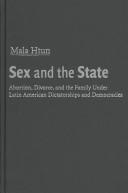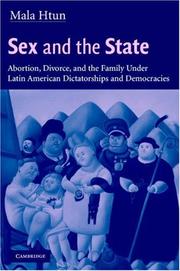| Listing 1 - 5 of 5 |
Sort by
|

ISBN: 0521810493 0521008794 0511615620 0511838018 Year: 2003 Publisher: Cambridge : Cambridge University Press,
Abstract | Keywords | Export | Availability | Bookmark
 Loading...
Loading...Choose an application
- Reference Manager
- EndNote
- RefWorks (Direct export to RefWorks)
Abortion, divorce, and the family: how did the state make policy decisions in these areas in Argentina, Brazil, and Chile during the last third of the twentieth century? As the three countries transitioned from democratic to authoritarian forms of government (and back), they confronted challenges posed by the rise of the feminist movement, social changes, and the power of the Catholic Church. The results were often surprising: women's rights were expanded under military dictatorships, divorce was legalized in authoritarian Brazil but not in democratic Chile, and no Latin American country changed its laws on abortion. Sex and the State explores these patterns of gender-related policy reform and shows how they mattered for the peoples of Latin America and for a broader understanding of the logic behind the state's role in shaping private lives and gender relations everywhere.
Family policy --- Sex role --- Politique familiale --- Rôle selon le sexe --- -Family policy --- -Sex role --- -Gender role --- Sex (Psychology) --- Sex differences (Psychology) --- Social role --- Gender expression --- Sexism --- Families --- Families and state --- State and families --- Public welfare --- Social security --- Social policy --- Government policy --- #A0507SO --- -#A0507SO --- Rôle selon le sexe --- Gender role --- Social Sciences --- Political Science --- Gender roles --- Gendered role --- Gendered roles --- Role, Gender --- Role, Gendered --- Role, Sex --- Roles, Gender --- Roles, Gendered --- Roles, Sex --- Sex roles
Book
ISBN: 1316484831 1139021060 1316481697 0521870569 0521690838 Year: 2016 Publisher: Cambridge, England : Cambridge University Press,
Abstract | Keywords | Export | Availability | Bookmark
 Loading...
Loading...Choose an application
- Reference Manager
- EndNote
- RefWorks (Direct export to RefWorks)
This book analyzes why and how fifteen Latin American countries modified their political institutions to promote the inclusion of women, Afrodescendants, and indigenous peoples. Through analysis and comparison of experiences in Argentina, Bolivia, Brazil, Chile, Colombia, and Mexico, the book accounts for the origins of quotas and reserved seats in international norms and civic mobilization. It shows how the configuration of political institutions and the structure of excluded groups set the terms and processes of inclusion. Arguing that the new mechanisms have delivered inclusion but not representation, the book demonstrates that quotas and reserved seats increased the presence in power of excluded groups but did not create constituencies or generate civic movements able to authorize or hold accountable their representatives.
Political participation --- Women --- Minorities --- Democracy --- Representative government and representation --- Political culture --- Self-government --- Political science --- Equality --- Republics --- Ethnic minorities --- Foreign population --- Minority groups --- Persons --- Assimilation (Sociology) --- Discrimination --- Ethnic relations --- Majorities --- Plebiscite --- Race relations --- Segregation --- Citizen participation --- Community action --- Community involvement --- Community participation --- Involvement, Community --- Mass political behavior --- Participation, Citizen --- Participation, Community --- Participation, Political --- Political activity --- Political behavior --- Political rights --- Social participation --- Political activists --- Politics, Practical --- Social aspects --- Latin America --- Asociación Latinoamericana de Libre Comercio countries --- Neotropical region --- Neotropics --- New World tropics --- Spanish America --- Politics and goverment --- Politics and government

ISBN: 9780521008792 9780511615627 9780521810494 Year: 2003 Publisher: Cambridge Cambridge University Press
Abstract | Keywords | Export | Availability | Bookmark
 Loading...
Loading...Choose an application
- Reference Manager
- EndNote
- RefWorks (Direct export to RefWorks)
Book
Year: 2003 Publisher: Cambridge University Press
Abstract | Keywords | Export | Availability | Bookmark
 Loading...
Loading...Choose an application
- Reference Manager
- EndNote
- RefWorks (Direct export to RefWorks)
Book
ISBN: 1108278620 110828096X 1108277896 1108417566 Year: 2018 Publisher: Cambridge, England : Cambridge University Press,
Abstract | Keywords | Export | Availability | Bookmark
 Loading...
Loading...Choose an application
- Reference Manager
- EndNote
- RefWorks (Direct export to RefWorks)
When and why do governments promote women's rights? Through comparative analysis of state action in seventy countries from 1975 to 2005, this book shows how different women's rights issues involve different histories, trigger different conflicts, and activate different sets of protagonists. Change on violence against women and workplace equality involves a logic of status politics: feminist movements leverage international norms to contest women's subordination. Family law, abortion, and contraception, which challenge the historical claim of religious groups to regulate kinship and reproduction, conform to a logic of doctrinal politics, which turns on relations between religious groups and the state. Publicly-paid parental leave and child care follow a logic of class politics, in which the strength of Left parties and overall economic conditions are more salient. The book reveals the multiple and complex pathways to gender justice, illuminating the opportunities and obstacles to social change for policymakers, advocates, and others seeking to advance women's rights.
Women's rights. --- Women --- Human females --- Wimmin --- Woman --- Womon --- Womyn --- Females --- Human beings --- Femininity --- Rights of women --- Women's rights --- Human rights --- Government policy. --- Legal status, laws, etc. --- Civil rights --- Law and legislation --- Women Legal status, laws, etc.
| Listing 1 - 5 of 5 |
Sort by
|

 Search
Search Feedback
Feedback About UniCat
About UniCat  Help
Help News
News